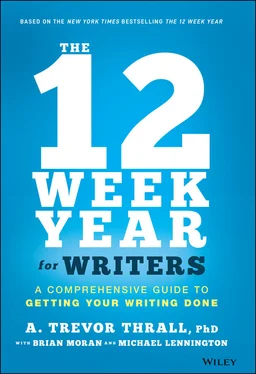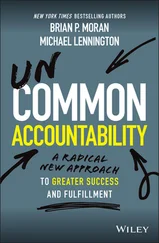You will start by creating a weekly schedule – the Model Week – to ensure that you can write as regularly as possible. You'll also use a simple time blocking strategy to ensure that your writing sessions are productive and as free as possible from distraction. This process will help you determine whether you have enough available time in your week to carry out your plan. If not, you may decide to lighten your plan or to find ways to carve out more time in your week. If you can't make your schedule work on paper, you won't make it work in reality. Finally, your 12 Week Plan will help you make the most out of whatever time you have for writing by making sure that you are as prepared as possible for every writing session.
Step 4: Managing Your Writing Process with the Weekly Execution Routine
Too often, people come up with a plan – even a great plan – and then fail to stick to it. The 12 Week Year includes a set of tools that you will use every week to align your daily actions with the goals and tactics in your 12 Week Plan. Together, these tools comprise the Weekly Execution Routine.
The first tool is your Weekly Plan. As you build each 12 Week Plan, you will align your key tactics with your deadlines. The tactic due dates will allow you to create a plan for each week. As you work through the 12 Week Year, you will take time at the start of each week to review your 12 Week Plan and create your Weekly Plan for the upcoming week. Your Weekly Plan is not a laundry list of to-do's; it is a concise list of the key tactics your 12 Week Plan identifies as critical for reaching your goals. Though you may need to tweak your plans as circumstances change, working from your Weekly Plan will keep your actions aligned with your goals and keep you focused on the most important things needed to get your writing done.
The second tool is weekly scorekeeping. Measurement drives every execution system. It is your anchor to reality. Effective measurement provides the feedback necessary to stay on track and hit your goals. For writers, this can mean tracking how often, how long, and how many words you write, along with other metrics depending on what sort of writing you're doing. Each week you'll score yourself based on what percentage of your tactics you completed and whether your key metrics are on track.
The third tool for managing your writing is the Weekly Accountability Meeting or, as I recommend to writers, the Weekly Writing Group. Studies show that groups make a huge difference in people's ability to hold themselves accountable for their actions. For writers, the benefits of weekly meetings with other writers go far beyond simple accountability. A writing group can inspire you, help you learn your craft, and give you valuable feedback on your work.
The fourth tool is your Model Week. Your Model Week, set at the beginning of each 12 Week Year, is your strategy for making sure you have blocked out enough time to get your writing done and to fulfill your other important obligations. Each week you will review your ideal time allocation as described in your Model Week, and make any modifications needed in your weekly calendar to adapt to unexpected time demands and still carve out the time needed to get your tactics done.
Your Weekly Execution Routine will help you to apply all these tools on a consistent basis. Each week you'll set aside time for a weekly review. Asking yourself how you did the previous week, you'll track your performance and update your scorecard, and review your 12 Week Plan to determine what's on your schedule for the week ahead. Every morning you'll conduct a quick “Daily Huddle” to make sure that you know exactly what tactics you need to focus on that day, and every week you'll meet with your accountability group or writing group to share your performance and your plans. By regularly following this routine, your writing will become more productive and predictable.
Step 5: Embracing Your Writer’s Mindset
Once you have your 12 Week Plan and all your management tools in place, it's time to embrace the writer's mindset and execute your writing plans in confidence. Longtime experience with thousands of users of the 12 Week Year has shown that you don't have to be perfect to reach your goals. If you're regularly completing about 80% of your weekly tactics, you're going to be successful (and you're going to feel that way too). Even better, as you gain experience with the system and start to see results, your confidence and momentum will grow. You will become more productive and your stress about getting your writing done will fade, replaced by a self-assurance that enables you to do your best work as a writer.
WHAT HAPPENS WHEN WRITERS USE THE 12 WEEK YEAR?
When you use the 12 Week Year to plan and manage your writing, you will write more prolifically, consistently, and happily, with less stress. This is because the 12 Week Year will help you overcome the most common obstacles writers face in getting their writing done. Recall the challenges I listed in Chapter 1. As the 12 Week Year Writer's Map illustrates (see Table 2.1), the tools and disciplines embedded in the 12 Week Year address all of these.
From here onward, your new planning horizon is the 12 Week Year, followed by another 12 Week Year, followed by another, and so on. Each 12 Week Year will stand on its own, allowing you to redefine your year around the goals that matter most to you right now. The very structure of a 12 Week Year will help you maintain energy and focus. Instead of looking way off in time and then waiting for the end of the year to provide a sense of urgency, operating within a 12 Week Year ensures that you won't lose track of what you're supposed to do today and provides the “end of year” sense of urgency to every week. Twelve weeks is long enough to get things done (it's about a semester of school, for example), but short enough that you will never lose sight of the finish line. Procrastination thrives when our deadlines lie far in the future. Productivity thrives when our deadlines approach, when our sense of urgency and motivation allow us to eliminate needless activity and to stay focused on what matters most.
The 12 Week Year provides faster and more useful feedback about your execution. If you miss your goals under an annual planning scenario, it's taken you a whole year to figure out that you need to do better. With the 12 Week Year you will know quickly if you're falling behind your schedule – you can't have many bad weeks and still hit your goals for a 12 Week Year. This feedback, delivered more frequently, will help you focus and stay on track better than any annual plan.
Table 2.1 The 12 Week Year Writer's Map
| What |
Why |
When |
How |
12 Week Year Disciplines |
| Crafting Your Vision |
Provides emotional connection to actionsProvides energy that increases commitment, motivationProvides direction for planning and actionHelps you prioritize between competing goalsHelps stakeholders to understand/support youExpands your sense of the possible |
Create at the start of 12 Week Year installationReview weekly and during 13 thweekUpdate as inspired |
Have-Do-Be exerciseAspirational VisionNear-term VisionWriter's Vision |
Vision Chapter 3 |
| Creating Your 12 Week Plan |
Clarifies prioritiesDefines strategy, goals, tacticsDefines action plans for each weekIncreases focusPrevents overwhelm |
At the beginning of each 12 Week Year make required adjustments over the 12 weeks as needed |
Create 12 Week PlanSet 12 Week GoalsIdentify tactics for each goal |
Planning Chapter 4 |
| Aligning Time with Your Plan |
Allocates necessary time to the most important thingsHelps others support you by honoring your writing timeScheduling provides consistency and rhythm for writingScheduling ensures you have capacity to carry out writing plans |
Set up Model Week at start of 12 Week YearAdjust time blocks weekly as required by emerging events/issuesFocus during each writing session |
Create Model WeekSchedule blocks for writing, buffer, and breakout timeSet time blocks for other events, meetings, and commitments |
Time Use Chapter 5 |
| Managing Your Writing Process and Getting Your Writing Done |
Ties daily actions to 12 Week GoalAdjusts quickly to stay on track with goalLeverages peer supportIncreases learning and improves problem solvingProvides encouragement and a sense of progressImproves ability to hold yourself accountableAdvances you toward your writing goals and vision |
Daily and weekly |
Work from a written weekly planScore weekly executionTrack weekly progress toward goalsAttend Writing/Accountability MeetingsFollow weekly execution RoutineEmbrace your Writer’s Mindset |
Process Control, Scorekeeping, and Time Use Chapters 5, 6, 7, 8 |
The 12 Week Year will also improve your focus. When you only have twelve weeks to get something done, and you can easily count the number of days and weeks you have left to finish something, your focus on getting things done will sharpen dramatically. During a 12 Week Year, you can't put things off until later; you can't imagine things will magically get done at the end of the year. In a 12 Week Year, things need to get done now.
Читать дальше












